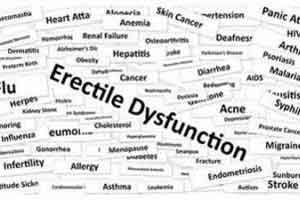- Home
- Editorial
- News
- Practice Guidelines
- Anesthesiology Guidelines
- Cancer Guidelines
- Cardiac Sciences Guidelines
- Critical Care Guidelines
- Dentistry Guidelines
- Dermatology Guidelines
- Diabetes and Endo Guidelines
- Diagnostics Guidelines
- ENT Guidelines
- Featured Practice Guidelines
- Gastroenterology Guidelines
- Geriatrics Guidelines
- Medicine Guidelines
- Nephrology Guidelines
- Neurosciences Guidelines
- Obs and Gynae Guidelines
- Ophthalmology Guidelines
- Orthopaedics Guidelines
- Paediatrics Guidelines
- Psychiatry Guidelines
- Pulmonology Guidelines
- Radiology Guidelines
- Surgery Guidelines
- Urology Guidelines
AUA's Guideline 2018 for Diagnosis,Treatment of Erectile Dysfunction

American Urological Association has released its AUA Guideline 2018 of Erectile Dysfunction. Arthur L. Burnett and colleagues have prepared new guidelines using the Pubmed, Embase, and Cochrane databases from 1/1/1965 to 7/29/2017 to provide a clinical strategy for the diagnosis and treatment of erectile dysfunction (ED) or the Clinicians
Erectile Dysfunction, ED is defined as the inability to attain and/or maintain penile erection sufficient for satisfactory sexual performance. The Panel also endorses the Fourth International Consultation on Sexual Medicine's ED definition as the consistent or recurrent inability to attain and/or maintain penile erection sufficient for sexual satisfaction.
Key Guideline Statements are given below :
Evaluation and Diagnosis:
- Men presenting with symptoms of Erectile Dysfunction,ED should undergo a thorough medical, sexual, and psychosocial history; a physical examination; and selective laboratory testing. (Clinical Principle)
- For the man with ED, validated questionnaires are recommended to assess the severity of ED, to measure treatment effectiveness, and to guide future management. (Expert Opinion)
- Men should be counseled that ED is a risk marker for underlying cardiovascular disease (CVD) and other health conditions that may warrant evaluation and treatment. (Clinical Principle)
- In men with Erectile Dysfunction ED, morning serum total testosterone levels should be measured. (Moderate Recommendation; Evidence Level: Grade C)
- For some men with ED, specialized testing and evaluation may be necessary to guide treatment. (Expert Opinion)
- For men being treated for ED, referral to a mental health professional should be considered to promote treatment adherence, reduce performance anxiety, and integrate treatments into a sexual relationship. (Moderate Recommendation; Evidence Level: Grade C)
- Clinicians should counsel men with ED who have comorbidities known to negatively affect erectile function that lifestyle modifications, including changes in diet and increased physical activity, improve overall health and may improve erectile function. (Moderate Recommendation; Evidence Level: Grade C)
- Men with ED should be informed regarding the treatment option of an FDA-approved oral phosphodiesterase type 5 inhibitor (PDE5i), including discussion of benefits and risks/burdens, unless contraindicated. (Strong Recommendation; Evidence Level: Grade B)
- When men are prescribed an oral PDE5i for the treatment of Erectile Dysfunction, instructions should be provided to maximize benefit/efficacy. (Strong Recommendation; Evidence Level: Grade C)
- For men who are prescribed PDE5i, the dose should be titrated to provide optimal efficacy. (Strong Recommendation; Evidence Level: Grade B)
- Men who desire preservation of erectile function after treatment for prostate cancer by radical prostatectomy (RP) or radiotherapy (RT) should be informed that early use of PDE5i post-treatment may not improve spontaneous, unassisted erectile function. (Moderate Recommendation; Evidence Level: Grade C)
- Men with Erectile Dysfunction and testosterone deficiency (TD) who are considering ED treatment with a PDE5i should be informed that PDE5i may be more effective if combined with testosterone therapy. (Moderate Recommendation; Evidence Level: Grade C)
- Men with Erectile Dysfunction should be informed regarding the treatment option of a vacuum erection device (VED), including discussion of benefits and risks/burdens. (Moderate Recommendation; Evidence Level: Grade C)
- Men with Erectile Dysfunction should be informed regarding the treatment option of intraurethral (IU) alprostadil, including discussion of benefits and risks/burdens. (Conditional Recommendation; Evidence Level: Grade C)
- For men with ED who are considering the use of IU alprostadil, an in-office test should be performed. (Clinical Principle)
- Men with ED should be informed regarding the treatment option of intracavernosal injections (ICI), including discussion of benefits and risks/burdens. (Moderate Recommendation; Evidence Level: Grade C)
- For men with ED who are considering ICI therapy, an in-office injection test should be performed. (Clinical Principle)
- Men with ED should be informed regarding the treatment option of penile prosthesis implantation, including discussion of benefits and risks/burdens. (Strong Recommendation; Evidence Level: Grade C)
- Men with ED who have decided on penile implantation surgery should be counseled regarding post-operative expectations. (Clinical Principle)
- Penile prosthetic surgery should not be performed in the presence of systemic, cutaneous, or urinary tract infection. (Clinical Principle)
- For young men with ED and focal pelvic/penile arterial occlusion and without documented generalized vascular disease or veno-occlusive dysfunction, penile arterial reconstruction may be considered. (Conditional Recommendation; Evidence Level: Grade C)
- For men with ED, penile venous surgery is not recommended. (Moderate Recommendation; Evidence Level: Grade C)
- For men with ED, low-intensity extracorporeal shock wave therapy (ESWT) should be considered investigational. (Conditional Recommendation; Evidence Level: Grade C)
- For men with ED, intracavernosal stem cell therapy should be considered investigational: (Conditional Recommendation; Evidence Level: Grade C)
- For men with Erectile Dysfunction, platelet-rich plasma (PRP) therapy should be considered experimental. (Expert Opinion)
The members of Guideline development committee have tried to include almost all aspects of Evaluation, Diagnosis and Treatment of Erectile Dysfunction to guide ,enable and empower Clinicians to deal with this delicate medical problem.
To read the full guideline click on the following link: Erectile Dysfunction

Disclaimer: This site is primarily intended for healthcare professionals. Any content/information on this website does not replace the advice of medical and/or health professionals and should not be construed as medical/diagnostic advice/endorsement or prescription. Use of this site is subject to our terms of use, privacy policy, advertisement policy. © 2020 Minerva Medical Treatment Pvt Ltd